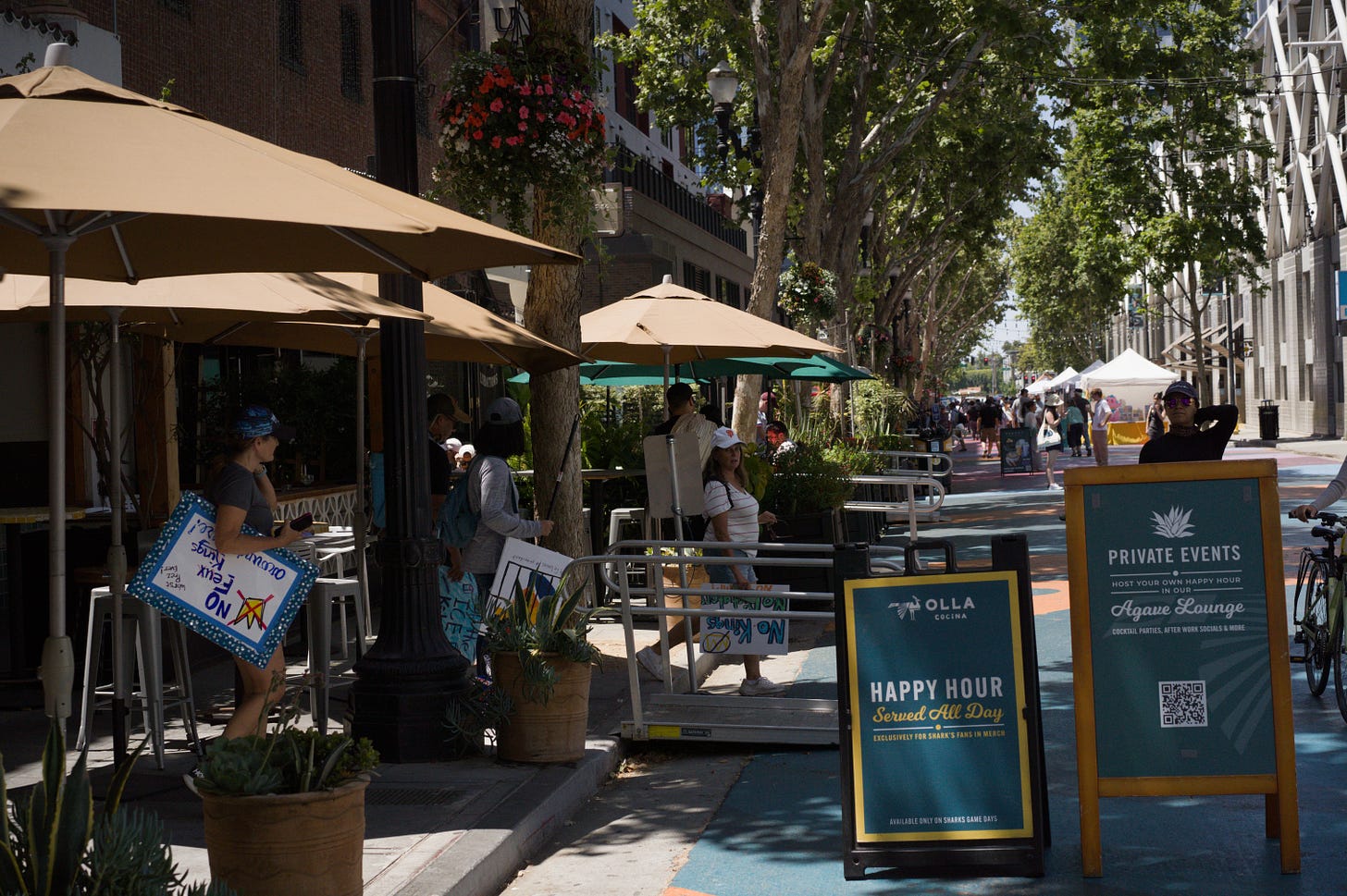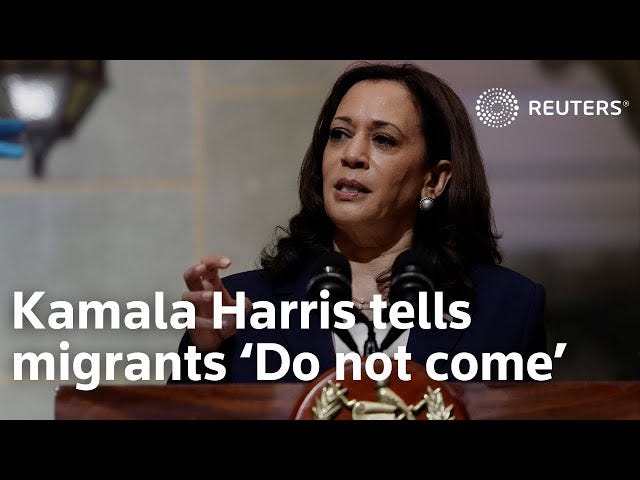‘No Kings’ must be about more than brunch
Protests alone don’t make change, but they can be the beginning of it
With a second protest planned for July 17, and a semi-affiliated No Kings 2.0 rally planned for the 4th (America’s original No Kings day) I find myself mentally reviewing the June 14th No Kings rally that I covered in San Jose, California. While not exactly “Black Pilled” I do find myself slightly bemused by the event.
If Los Angeles is the truculent younger California sibling and San Francisco the more restrained older sister, San Jose is the kind of bland middle child who wants everyone to just get along. This was on full display as the original No Kings rally unfolded across the Golden State and the country en masse. In LA, the protests bordered on direct action in their standoff with police as did San Franciscans with their barricading of an ICE facility on Tehama street.
Meanwhile in San Jose, 10,000 people gathered downtown in St. James park to play music, show each other their pithy signs, and enjoy an afternoon of shopping and dining at trendy San Pedro Square, which is not actually a square but more of a short pedestrian walkway.
Perhaps I am downplaying the protest’s significance. They did succeed in irritating Trump. If only because they distracted from his bootleg military birthday parade. And, it was a far cry better than the typical, sterile lib approach which strives to be completely detached from any meaningful engagement with material reality. Relying instead upon a puppet show of signs and signifiers that in no way impact the greater political project but do make us all feel better for being polite and decolonizing our gardens.
As I meandered through St. James Square, it was easy to forget that I was at a protest not a carnival. The lighthearted atmosphere, replete with dancers and a thousand different bluetooth speakers each playing its own genre of music, belied the very heavy and violent centerpieces of anti-authoritarianism and anti-ICE.
The majority of the congregants carried signs condemning the Trump administration for its many outrages, but primarily his use of masked Gestapo units to snatch people from churches, schools, and courthouses.
There were a handful of other causes being championed as well, from environmentalism to a small antiwar presence. Several unions were represented. Although attending, the pro-Palestinian contingent was sadly meagre. There was also a lone CPUSA flag being waived. Despite the diversity, this was quite plainly a big “D” Democratic event. So much so that a Cory Booker 2028 placard was spotted.
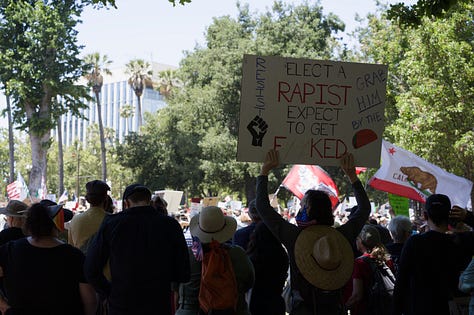
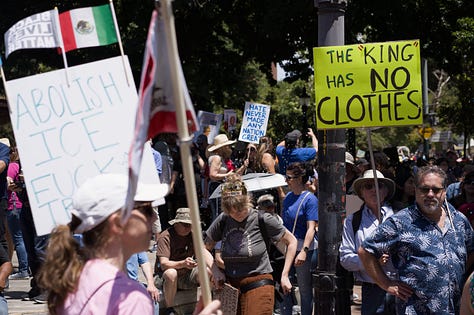



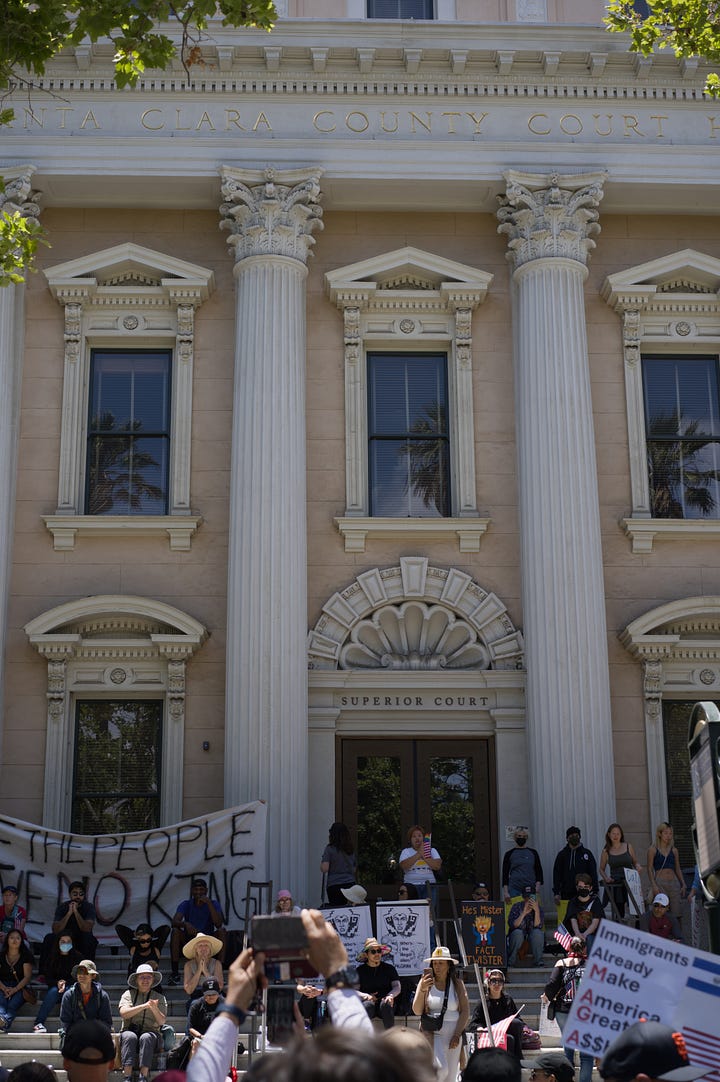
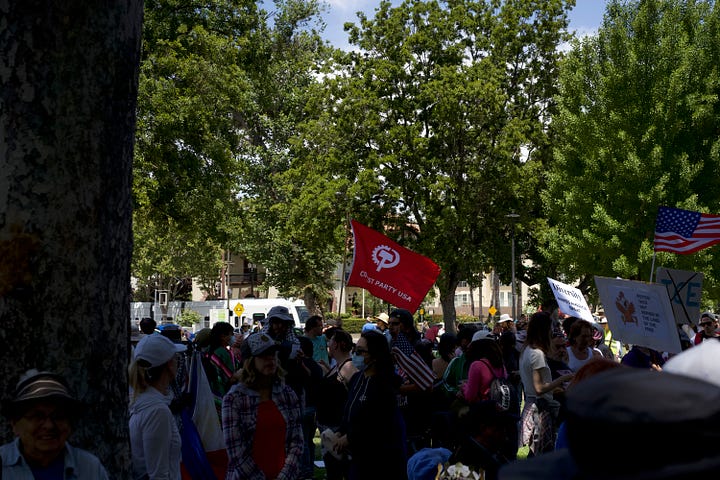
At the edge of St. James Park stands a bronze statue of President William McKinley which commemorates his visit to the spot shortly before his assassination. I’d like to think this bit of historical trivia influenced the protest organizers’ choice of location, but if it did, they never mentioned it. Or if they did mention it, no one could hear it being said. Standing at the feet of the assassinated president, several orators, including former vice mayor Rose Herrera, attempted to make their thoughts on the current president known. Unfortunately, they seemed to have the only underpowered speaker in the park. Even the first row of people had a hard time hearing what they were saying, but it was generally understood they were displeased with the state of things.
Perhaps that is my biggest gripe. Even the No Kings website offers no grander vision beyond a return to the pre-Trump status quo without so much as acknowledging that it was precisely that status quo which gave rise to the problem in the first place. Granted, specific crimes committed by our government do not necessitate a general protest against the very roots of our economic-political structure, but isn’t that what the “No Kings” label insinuates?
It was announced that over 30,000 people were in attendance, but those numbers were later revised to 10,000. The gathering had scores of volunteers in yellow vests who patrolled the crowd and made sure the traffic on the nearby streets was not impeded.
The only moment of disruption came when a large group marched southbound on Second Street, crossing intersections without waiting for the lights. It was a brief flirtation with disorder. Once again, the status quo reasserted itself, not through state enforcement, but through the internalized impulse to self-police. No cops needed.
In the aftermath of the event, local shops and restaurants were all packed with protesters spending their money while the nearest police cruiser sat three or four blocks away, unbothered. At first glance, a protest that in no way inconvenienced anybody, brought buckets of cash to local businesses, and had no conflicts whatsoever sounds like a huge win for everyone!
But I couldn’t shake the feeling that we’d just been granted a holiday by a squabbling royal family. A sanctioned day to play rebel at the Feast of Fools, before returning to till the lords fields on Monday. “We don’t care who you’re mad at as long as you buy our products, eat our food, work in our offices, and finance our ambitions.” Again, the physical act of getting together is a step in the right direction, but done like this, “No Kings” smells like infighting amongst nobles at court, and no matter who wins, you and I will remain peasants.
Instead of taking aim at the fundamentals that not only allowed a figure like Trump to emerge but practically demanded one, the San Jose No Kings protest (and I’m sure many others) spat at the superstructure of repugnance while leaving the rubbish heap on which it is built entirely untouched. A viral photo from another No Kings protest featuring a sign that reads, “If Kamala were president we’d be at brunch” captures this vibe singularly well.
The No Kings protests surely would not be happening if Kamala Harris was in the Whitehouse and, as many have already pointed out, that is the problem. We’d still be bankrolling a genocide in Gaza with money wrung from American taxpayers. We would still be siphoning resources from the poorest countries in the world to build bigger yachts for billionaires. Our meddling in the Americas, exportation of neoliberal austerity, and financial warfare on countries like Venezuela, Nicaragua, and Cuba would still be creating refugees who we would then treat as criminals once they arrived at our gates, only allowing a pittance of asylum seekers to even cross the border.
This is not to understate the horrors this administration has unleashed. Trump has expanded the state sanctioned brutalization of immigrants to levels not seen in this century. He’s done everything in his power to bolster a two-tiered society in which, no matter how poor or powerless a white man might be, he will always have someone with a bit more melanin over whom he can assert dominance. And now, he is blundering his way through a war with Iran. However, each of these horrors and a hundred not listed here, are very American horrors. Every power the Trump administration is utilizing, every instance of cruelty, has its roots running through a bipartisan consensus. It's as if we built a throne and expected no one to sit on it. Or if they were going to take a seat, that they would at least have the good graces to be a bit more coy about it.
A favored chant that would often bubble up from the gathered protesters was, “This is what democracy looks like!” Upon hearing it, I couldn’t help but think, “is it?” Because if this is democracy, shouldn’t there be at least the possibility of actual participation? A meaningful say in the conditions of our lives? A protest may feel empowering, but without mechanisms for collective decision making, without real stakes, it’s more spectacle than substance and even runs the risk of relieving enough pressure from a movement, via catharsis to stop it entirely.
Yet I feel the rallies do still matter.
Real politics read: transformative politics, emerges from shared experience, from living and working together. From a recognition of common exploitation. From being out in the community together. That’s why, cynical as I may sound, these protests do give me some hope. Not because the protests themselves will change anything—they won’t—but because these gatherings create a powerful collective experience. They create another avenue to foster connection, solidarity, and, dare I say it, class consciousness. And if that consciousness takes hold, things will become a bit more disruptive—we will not merely aim to slow or even reverse our descent into a “Sorry to Bother You” style capitalist hellscape, we’ll aim a bit higher.
Communal experience fosters communal action, not just against what exists, but for what should be. When politics step away from the performative, it becomes disruptive—disruptive to brunch plans and quarterly earnings alike. Because real change doesn’t come from protest-as-festival, it comes when people stop working, start organizing, and make the collective decision to build something better. Something new.
Maybe that’s why the next No Kings rally is on a Thursday. Workday rebellions hit different.



